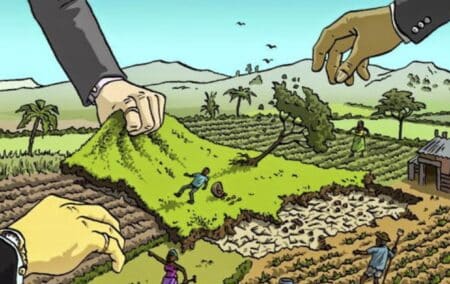Last Saturday, I crafted a Press Release, headlined AGOA: why the silence on grave EWC risk?
It began: ‘The AGOA Forum entered its final day in Johannesburg amid threats, fanfare, and big promises, but not a word from officials on either the US or South African side has been said about the risk of South Africa’s exit due to the Expropriation Bill’s provisions for expropriation without compensation (EWC).
‘To be eligible for the zero-tariff market access provided for by the African Growth and Opportunity Act (AGOA), the first requirement of this US law is that the African country seeking the benefit “has established, or is making continual progress toward establishing (A) a market-based economy that protects private property rights”.’
(This statement was reflected in the Daily Friend news and dispatches piece, IRR warns of EWC risk to SA’s AGOA access, of 6 November.)
The statement prompted a response from ANC MP Faiez Jacobs.
Jacobs wrote: ‘Hi Gabriel. Herewith my chat gpt-assisted response to your fear-mongering article. Lets engage. Please publish it, if IRR is committed to respecting diverse views. If you are not prepared to publish it, then remove me from your mailing list.’ (Some, but not all, typos in the original have been corrected.)
I wrote back to Jacobs:
Greetings Faiez Jacobs MP,
Thank for your response. I will pass along to those in charge of publishing.
There is one point of clarity I would like to ask. Is it your view that the benefits of passing the Expropriation Bill into law outweigh the costs of being kicked out of Agoa?
Regards,
Gabriel
This question has remained unanswered in the days since.
However, as the IRR most certainly is ‘committed to respecting diverse views’, the Daily Friend is unreservedly agreeable to sharing the ‘chat-gpt-assisted response’ from Faiez Jacobs, which is published, as received, below.
‘Strengthening the Case for Self-Determination and Fair Trade in Africa
Historical Background and the Imperative for Redress
To comprehend the business case for self-determination in Africa, one must consider the historical context—centuries of colonization and decades of apartheid policies, particularly in South Africa, have skewed land ownership and economic power. The Expropriation Bill is an effort to address this imbalance and to facilitate redress for those historically disenfranchised. While controversial, the Bill reflects a legitimate exercise of national sovereignty to correct long-standing injustices, which is a fundamental step towards fostering a more inclusive and sustainable economy.
Economic Rationale and Business Sense
Self-determination in economic policies enables a country to tailor its strategies to local needs and conditions, promoting innovation and entrepreneurship. South Africa’s approach can attract investment in industries that prioritize social impact, tapping into a growing global trend where investors seek not just financial returns but also social good. In the long term, a more equitable distribution of resources and ownership can lead to a more stable and robust market, benefiting both local and international businesses.
The Need for Fairer Trade
The principle of fair trade extends beyond ensuring that trade partners receive equitable financial returns; it also encompasses the fair treatment of trading nations, allowing them to pursue their developmental goals. AGOA, while designed to promote trade and economic growth, must also be flexible enough to recognize the different stages and strategies of development across African nations. The application of a one-size-fits-all model, particularly in terms of property rights, overlooks the diverse socio-economic realities on the continent.
Innovation Through Self-Determined Policies
South Africa’s pursuit of land reform can also be seen as a broader commitment to innovative and transformative policies that extend beyond traditional economic metrics. By seeking to address historical inequities, South Africa is essentially investing in social innovation, which can lead to unique business models and opportunities that align with global sustainability goals.
Aligning With Global Economic Shifts
The global economy is increasingly moving towards models that value sustainability and social equity. South Africa’s approach, if implemented with careful balancing of interests, can resonate with this shift and open up opportunities for ‘impact investment’. Additionally, equitable land distribution can lead to a more participatory economy, with new entrants in the market fostering competition, innovation, and broader economic participation.
Conclusion: Advocating for a More Inclusive Global Economy
In making a business case for South Africa’s self-determined policy approach, it is crucial to argue that the long-term stability and growth of the global economy require the inclusion of diverse economic models that address historical and regional disparities. The international trade system should thus encourage fairer trade relations that support innovation, redress, and economic diversity, laying the groundwork for a more resilient and inclusive global market.
FAIEZ JACOBS ANC MP for GREATER ATHLONE & WHIP SMALL BUSINESS DEVELOPMENT PORTFOLIO COMMITTEE’.

